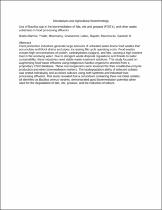 ResearchSpace
ResearchSpace
Use of Bacillus spp in the bioremediation of fats, oils and greases (FOG’s), and other waste substrates in food processing effluents
JavaScript is disabled for your browser. Some features of this site may not work without it.
- ResearchSpace
- →
- Research Publications/Outputs
- →
- Conference Publications
- →
- View Item
| dc.contributor.author |
Roets-Dlamini, Yrielle

|
|
| dc.contributor.author |
Moonsamy, Ghaneshre

|
|
| dc.contributor.author |
Lalloo, Rajesh

|
|
| dc.contributor.author |
Ramchuran, Santosh O

|
|
| dc.date.accessioned | 2023-10-05T08:06:08Z | |
| dc.date.available | 2023-10-05T08:06:08Z | |
| dc.date.issued | 2022-07 | |
| dc.identifier.citation | Roets-Dlamini, Y., Moonsamy, G., Lalloo, R. & Ramchuran, S.O. 2022. Use of Bacillus spp in the bioremediation of fats, oils and greases (FOG’s), and other waste substrates in food processing effluents. <i>Biocatalysis and Agricultural Biotechnology, 42.</i> http://hdl.handle.net/10204/13116 | en_ZA |
| dc.identifier.issn | 1878-8181 | |
| dc.identifier.uri | https://doi.org/10.1016/j.bcab.2022.102351 | |
| dc.identifier.uri | http://hdl.handle.net/10204/13116 | |
| dc.description.abstract | Food production industries generate large amounts of untreated water-borne food wastes that accumulate and block drains and pipes, increasing life cycle operating costs. Food wastes contain high concentrations of protein, carbohydrates (sugars), and fats, causing a high nutrient load in the receiving water. Due to stringent waste disposal regulations and threats to water sustainability, these industries need viable waste treatment solutions. This study focused on augmenting food waste effluents using indigenous Bacillus organisms selected from a proprietary CSIR database. These microorganisms were screened for their constitutive enzyme production and other bioremediation markers. The biodegradation ability of selected isolates was tested individually and as mixed cultures using both synthetic and industrial food processing effluents. This study revealed that a consortium containing three microbial isolates, all identified as Bacillus cereus variants, demonstrated good bioremediation potential when used for the degradation of fats, oils, greases, and the reduction of odours. | en_US |
| dc.format | Abstract | en_US |
| dc.language.iso | en | en_US |
| dc.relation.uri | https://www.sciencedirect.com/science/article/pii/S1878818122000780 | en_US |
| dc.source | Biocatalysis and Agricultural Biotechnology, 42 | en_US |
| dc.subject | BacillusFood waste | en_US |
| dc.subject | Bioremediation | en_US |
| dc.subject | Bio-augmentation | en_US |
| dc.subject | Bio-surfactant | en_US |
| dc.subject | Emulsification | en_US |
| dc.title | Use of Bacillus spp in the bioremediation of fats, oils and greases (FOG’s), and other waste substrates in food processing effluents | en_US |
| dc.type | Article | en_US |
| dc.description.pages | 8 | en_US |
| dc.description.note | © 2022 Elsevier Ltd. All rights reserved. Due to copyright restrictions, the attached PDF file only contains the abstract of the full text item. For access to the full text item, please consult the publisher's website: https://www.sciencedirect.com/science/article/pii/S1878818122000780 | en_US |
| dc.description.cluster | Chemicals | en_US |
| dc.description.impactarea | BT: Processing | en_US |
| dc.identifier.apacitation | Roets-Dlamini, Y., Moonsamy, G., Lalloo, R., & Ramchuran, S. O. (2022). Use of Bacillus spp in the bioremediation of fats, oils and greases (FOG’s), and other waste substrates in food processing effluents. <i>Biocatalysis and Agricultural Biotechnology, 42</i>, http://hdl.handle.net/10204/13116 | en_ZA |
| dc.identifier.chicagocitation | Roets-Dlamini, Yrielle, Ghaneshre Moonsamy, Rajesh Lalloo, and Santosh O Ramchuran "Use of Bacillus spp in the bioremediation of fats, oils and greases (FOG’s), and other waste substrates in food processing effluents." <i>Biocatalysis and Agricultural Biotechnology, 42</i> (2022) http://hdl.handle.net/10204/13116 | en_ZA |
| dc.identifier.vancouvercitation | Roets-Dlamini Y, Moonsamy G, Lalloo R, Ramchuran SO. Use of Bacillus spp in the bioremediation of fats, oils and greases (FOG’s), and other waste substrates in food processing effluents. Biocatalysis and Agricultural Biotechnology, 42. 2022; http://hdl.handle.net/10204/13116. | en_ZA |
| dc.identifier.ris | TY - Article AU - Roets-Dlamini, Yrielle AU - Moonsamy, Ghaneshre AU - Lalloo, Rajesh AU - Ramchuran, Santosh O AB - Food production industries generate large amounts of untreated water-borne food wastes that accumulate and block drains and pipes, increasing life cycle operating costs. Food wastes contain high concentrations of protein, carbohydrates (sugars), and fats, causing a high nutrient load in the receiving water. Due to stringent waste disposal regulations and threats to water sustainability, these industries need viable waste treatment solutions. This study focused on augmenting food waste effluents using indigenous Bacillus organisms selected from a proprietary CSIR database. These microorganisms were screened for their constitutive enzyme production and other bioremediation markers. The biodegradation ability of selected isolates was tested individually and as mixed cultures using both synthetic and industrial food processing effluents. This study revealed that a consortium containing three microbial isolates, all identified as Bacillus cereus variants, demonstrated good bioremediation potential when used for the degradation of fats, oils, greases, and the reduction of odours. DA - 2022-07 DB - ResearchSpace DP - CSIR J1 - Biocatalysis and Agricultural Biotechnology, 42 KW - BacillusFood waste KW - Bioremediation KW - Bio-augmentation KW - Bio-surfactant KW - Emulsification LK - https://researchspace.csir.co.za PY - 2022 SM - 1878-8181 T1 - Use of Bacillus spp in the bioremediation of fats, oils and greases (FOG’s), and other waste substrates in food processing effluents TI - Use of Bacillus spp in the bioremediation of fats, oils and greases (FOG’s), and other waste substrates in food processing effluents UR - http://hdl.handle.net/10204/13116 ER - | en_ZA |
| dc.identifier.worklist | 25915 | en_US |





